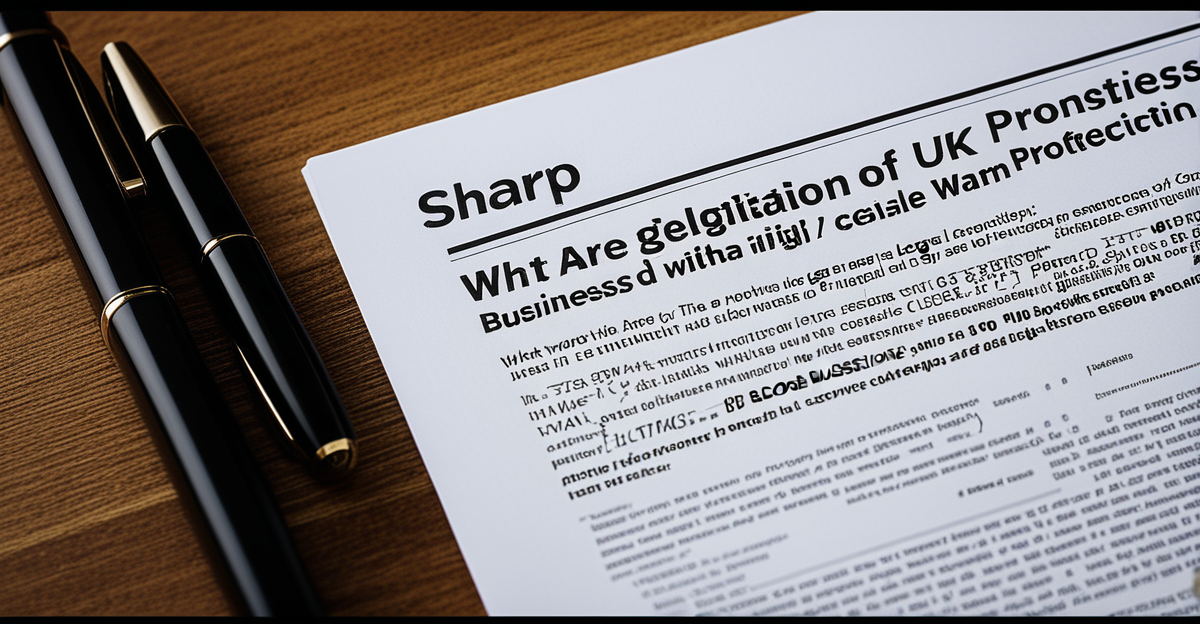Core Legal Responsibilities for UK Businesses in Consumer Protection
In the UK, businesses have clear legal obligations under consumer protection law to ensure fair treatment and safety for every customer. These responsibilities include providing accurate information, engaging in fair trading practices, and addressing consumer complaints effectively. Businesses must not mislead customers with dishonest advertising or hide crucial details about products or services.
Key UK consumer protection legal obligations require businesses to:
Topic to read : How Does Brexit Impact UK Business Legal Frameworks?
- Offer goods and services that meet set quality and safety standards.
- Present transparent pricing and terms before purchase.
- Resolve consumer issues promptly and fairly, maintaining records of complaints.
Failure to meet these enforceable consumer rights may lead to severe consequences, including fines, legal action, and damage to reputation. Regulatory bodies like Trading Standards monitor compliance and can take enforcement action if a company breaches these responsibilities. Staying aligned with these laws also helps businesses build trust and long-term customer relationships.
Understanding these core responsibilities equips businesses to navigate the complex landscape of consumer law confidently and avoid penalties for non-compliance while fostering a positive consumer experience. Compliance is both a legal duty and a strategic advantage.
Also to see : What Are the Key Considerations for Navigating UK Business Acquisition Laws?
Core Legal Responsibilities for UK Businesses in Consumer Protection
Ensuring consumer safety and fair treatment is a fundamental UK consumer protection legal obligation for all businesses. Companies must guarantee that their products and services comply with safety standards and do not pose risks to consumers. This responsibility extends beyond merely avoiding harm; it requires proactive measures to maintain a fair marketplace.
Key legal duties include providing clear information about products, such as accurate descriptions, prices, and labelling. Fair trading practices demand that advertising is honest and not misleading, allowing consumers to make informed decisions. Businesses also have an obligation to handle complaints efficiently, demonstrating commitment to resolving disputes and maintaining consumer trust.
Ignoring these requirements can lead to serious consequences. Non-compliance with enforceable consumer rights may result in fines, sanctions, or legal action from authorities such as Trading Standards. Furthermore, breaches can damage reputation and customer loyalty. UK businesses must thus embed these responsibilities in their practices to comply with legal standards and foster positive consumer relationships.
Key UK Consumer Protection Laws and Their Application
UK consumer protection laws set the legal framework that shapes business responsibilities and safeguards consumer rights. The cornerstone legislation is the Consumer Rights Act 2015, which mandates that goods must be of satisfactory quality, fit for purpose, and match descriptions provided by sellers. When businesses fail to meet these expectations, consumers have enforceable rights to reject goods, demand repairs or replacements, or seek refunds.
Trading Standards plays a pivotal role in enforcing these laws. This regulatory body investigates breaches, advises businesses, and can initiate enforcement actions against non-compliant companies. Its involvement ensures that UK consumer protection laws are more than theoretical, acting as a practical mechanism to uphold fairness.
In addition to the Consumer Rights Act, the Consumer Protection from Unfair Trading Regulations 2008 prohibits misleading advertising and aggressive sales tactics. The Sale of Goods Act, while largely superseded, still underpins some transactions and reinforces basic quality standards.
Together, these statutes create a robust legal environment. Businesses must understand these UK consumer protection laws to respect consumer rights fully and avoid penalties or legal challenges. Compliance demonstrates respect for consumers and bolsters trust, essential for long-term success.
Core Legal Responsibilities for UK Businesses in Consumer Protection
Businesses in the UK must adhere strictly to UK consumer protection legal obligations, which prominently include ensuring consumer safety and fair treatment. This obligation means companies must act proactively, not only preventing harm but also providing clear, accurate information about products and services. Transparency is key: pricing, product descriptions, and terms must be honest and easy to understand.
Fair trading practices are essential. Businesses are legally bound to avoid misleading advertising and should refrain from practices that could deceive or disadvantage consumers. Failure to maintain these standards violates enforceable consumer rights, exposing the business to possible legal penalties.
Another critical business responsibility concerns complaint resolution. UK law requires firms to address consumer issues promptly, fairly, and effectively, demonstrating accountability and fostering trust. Maintaining records of complaints and actions taken ensures compliance and can be crucial in legal contexts.
Non-compliance with these UK consumer protection legal obligations can result in severe consequences, including fines, legal actions, and reputational damage. Enforcement bodies, such as Trading Standards, actively monitor these responsibilities and can impose sanctions when businesses fail to uphold them. Adhering to these core responsibilities not only ensures legal compliance but also supports sustainable customer relationships.
Core Legal Responsibilities for UK Businesses in Consumer Protection
UK businesses bear crucial legal obligations to protect consumers by ensuring safety, transparency, and fairness. Fundamental business responsibilities include adhering to UK consumer protection legal obligations that mandate honest advertising, clear product information, and fair trading practices. For example, businesses must provide accurate descriptions and prices upfront, allowing consumers to make informed purchasing decisions without deception.
A key aspect of these responsibilities is effective complaint resolution. Companies must establish processes to handle consumer complaints promptly and fairly, recording issues to demonstrate compliance and commitment. These steps uphold enforceable consumer rights, enabling consumers to seek remedies when goods or services do not meet legal standards.
Failing to fulfil these duties can lead to substantial consequences. Non-compliance risks legal sanctions such as fines and enforcement from authorities like Trading Standards. Moreover, breaches harm reputation and customer loyalty, impacting long-term success. Therefore, embedding these obligations into everyday practices is essential not only to comply with consumer protection law but also to build trust through ethical business conduct.
Core Legal Responsibilities for UK Businesses in Consumer Protection
Businesses operating in the UK are bound by UK consumer protection legal obligations that prioritize the safety and fair treatment of consumers. This means companies must actively ensure their goods and services do not cause harm and must provide transparent, truthful information to allow informed consumer decisions.
Key business responsibilities include engaging in fair trading practices, such as presenting honest advertising and clear pricing, thus avoiding misleading or deceptive tactics. Accurate product descriptions and transparent contract terms are essential components of these obligations. Companies must also maintain efficient processes for complaint resolution, responding promptly to issues and documenting actions taken to uphold consumer rights.
Failing to meet these enforceable consumer rights can result in significant repercussions. Businesses risk fines, legal sanctions, and damage to their reputation if they breach these duties. Regulatory bodies like Trading Standards can intervene, enforcing compliance and protecting consumers from unfair practices. Upholding these responsibilities not only satisfies legal mandates but also fosters trust and sustainable consumer relationships, reinforcing a company’s credibility and market position.
Core Legal Responsibilities for UK Businesses in Consumer Protection
UK businesses must rigorously uphold UK consumer protection legal obligations that focus on ensuring consumer safety and guaranteeing fair treatment throughout the purchasing process. The cornerstone of these business responsibilities includes abiding by principles of fair trading and honest advertising. For example, companies are legally required to present clear information about their products and services—such as precise descriptions, transparent pricing, and accessible terms—to avoid misleading consumers. This clarity empowers buyers to make informed decisions based on truthful facts rather than deceptive claims.
Handling complaints effectively is another critical area under these obligations. Businesses must establish robust systems for consumer complaint handling, resolving disputes promptly and fairly. Timely resolution often prevents escalation and demonstrates respect for enforceable consumer rights. Maintaining detailed records of complaints and resolutions also proves essential for compliance verification if regulatory bodies investigate.
Failure to meet these business responsibilities can lead to serious consequences. Non-compliance exposes firms to legal penalties, including fines and enforcement actions by authorities like Trading Standards. Additionally, poor adherence to consumer protection rules harms reputation and consumer trust, which undermines long-term commercial success. Prioritising these legal duties is thus vital for both legal compliance and fostering positive consumer relationships.
Core Legal Responsibilities for UK Businesses in Consumer Protection
UK businesses must prioritise consumer safety and ensure fair treatment as part of their fundamental UK consumer protection legal obligations. These responsibilities include maintaining enforceable consumer rights by adhering to strict legal standards around fair trading practices. Businesses are required to provide clear, honest information about products and services, including accurate pricing and transparent contract terms that enable consumers to make informed decisions without deception.
In addition, firms must ensure advertising is truthful and not misleading, reflecting their business responsibilities to uphold market integrity. Complaint resolution is another crucial area; companies must implement effective processes to handle consumer complaints promptly and fairly. This not only meets legal expectations but also fosters trust and accountability.
Non-compliance with these obligations carries significant risks. Breaching UK consumer protection legal obligations can trigger enforcement actions, including fines and sanctions from authorities like Trading Standards. Beyond legal penalties, businesses face potential reputational damage and loss of consumer confidence. Successfully meeting these responsibilities ensures compliance and builds stronger, long-lasting relationships with customers, reinforcing a company’s credibility in the marketplace.







